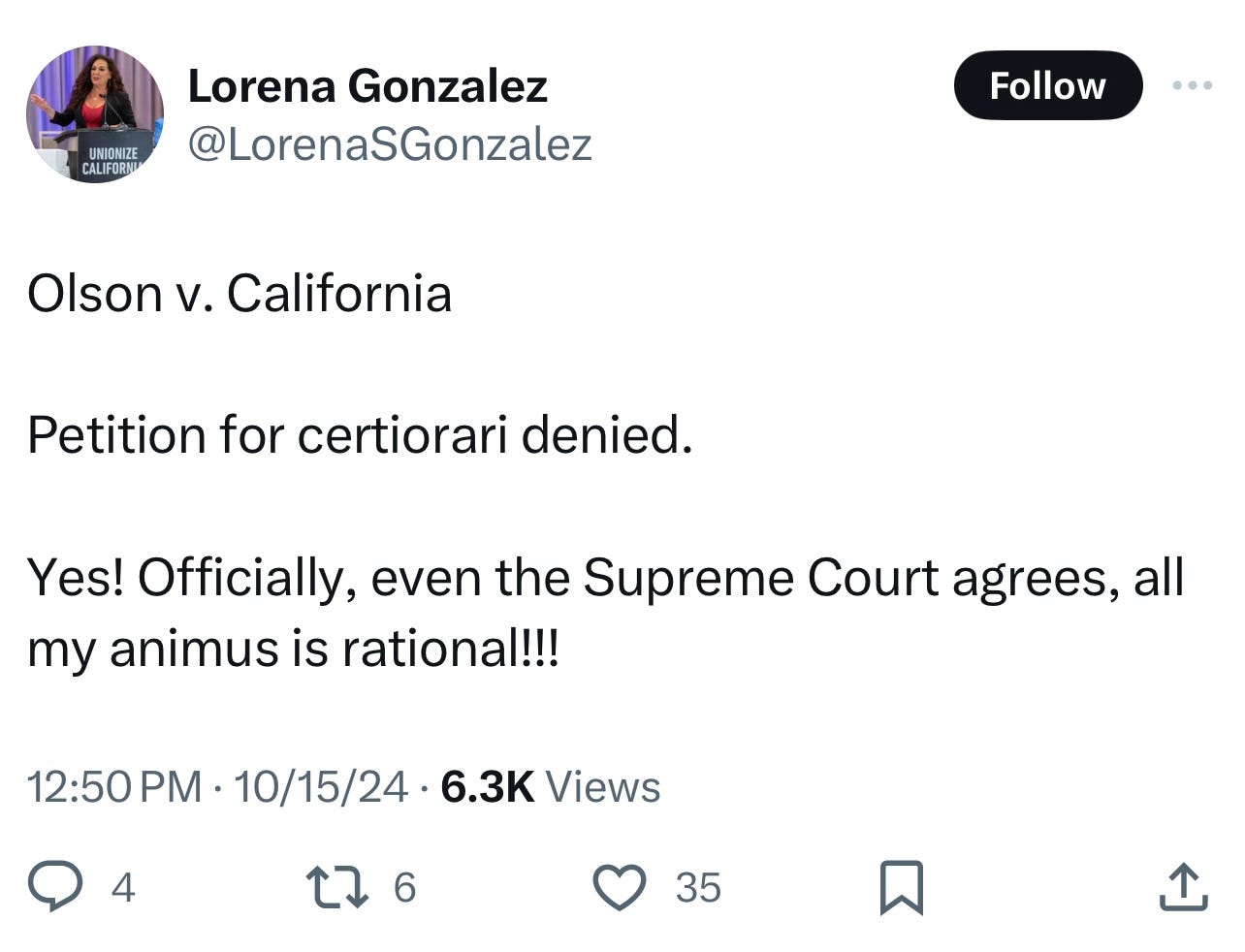Extremism, Indeed
Freelance busting is not moderate policymaking. It stems from the kind of militant thinking that most people reject.
Alex McDonald, an attorney with the Littler firm, said something that really hit home with me this week on the Labor Relations Radio podcast.
Admittedly, I was in a certain frame of mind while listening. The U.S. Supreme Court had just declined to hear a challenge to California’s freelance-busting law, Assembly Bill 5. As Law 360 reported, this is “likely the end of the line" for major challenges to the statute, which continues to harm independent contractors to this day.
The plaintiffs in that case claimed that AB5’s sponsor, then-Assemblywoman Lorena Gonzalez, showed “irrational animus” while denying them exemptions from the law while granting exemptions to others.
After the U.S. Supreme Court declined to take the case, Gonzalez tweeted this, sounding unabashedly giddy:
All my animus is rational!!!
Animus is a fancy word for hate. It means “prejudiced and often spiteful or malevolent ill will.”
So, we have a card-carrying Teamster who sponsored a law that destroyed the income and careers of independent contractors across California, and that kicked off a wave of freelance busting now threatening the livelihoods of tens of millions of independent contractors, believing that she was fully justified in using the power of government to channel the hate she feels toward non-union businesses.
Imagine a person with that kind of power tweeting, “All my hate is rational!!!”
This is where we’re at with the people leading the current wave of freelance busting nationwide.
I was trying to come to terms with that disturbing state of affairs while I was out walking my dog and listening to McDonald on the podcast. He and the host were talking about how labor law, as it currently stands, has actually fulfilled its intent, which was to achieve labor peace.
McDonald has also written about this topic, explaining that when lawmakers crafted our labor laws decades ago, they were trying to stop the economically devastating strikes of the early 20th century—strikes that shut down railroad traffic across large swaths of the country, and that led to bloody, fatal clashes with federal troops. We don’t see those things happening in America today because our labor laws have created a condition of labor peace. We promote collective bargaining in a way that maintains broader calm.
That’s a heck of a different mentality than union leaders who believe it’s OK to wield power in a way that they know will harm innocent people.
McDonald explained, on the podcast, how what we are experiencing right now is a more combative and militant approach to labor relations than we’ve seen in the United States in a long time:
“I think this is a clear trend, if you’re watching what’s happening in unions, and I think maybe, at least part of the explanation is … the decline in unionization. Which is, once you start to narrow your membership down to 6% of the private-sector workforce, you’re left with the hardcore, right? And we see this with political parties, actually. …
“The rational response would be: We need to broaden the tent because our tent has become so small. We need to start capturing the middle. But what you actually have is the only people who are still left inside the tent are the true believers, who think, have always thought, have always been in the party, but now are the only ones left ... who are driving the policy. They’re sitting in all the leadership positions. They’re driving the bus.
“And that can have sort of a self-fulfilling spiral internally where the policies of a party, or of a union, focus on the desires of the members, the current members, which are extremely … relative to the middle, militant and hardcore and the type of person who is going to engage in more combative tactics than just the middle-of-the-road guy who wants a bigger paycheck.”
I was still digesting McDonald’s perspective when I saw this opinion column pop up from a leading newspaper columnist in my home state of New Jersey.
This columnist, Tom Moran, is not known for holding back on saying what he thinks. His most recent tweets call a Democratic power broker a jerk and the Republican candidate for president a monster.
The column he wrote this week was about the recent port strike led by Harold Daggett—a shockingly well-paid unionist and ally and friend of Democratic New Jersey Governor Phil Murphy.
Daggett threatened to shut down the entire U.S. economy unless he got his way, which, thanks largely to the Democratic Biden administration, he did. Moran’s take on Daggett is clear in the headline:
Moran described Daggett like this:
“… is no champion of the common man. He takes too much money from the paychecks of his 85,000 members. And it’s not just his family. He’s built a bureaucracy that’s richly paid as well. In 2023 alone, the Monitor found, 30 top union executives were paid a combined $9 million, an average of $300,000. The union’s 25 vice-presidents earn as much $554,000.
“Why does this matter? … It damages the reputation of the labor movement and weakens its political hand in Washington. How can a labor leader like Daggett make a moral argument in favor of economic justice when he’s living like a king himself?”
It sure doesn’t sound as if that union leader’s goal is labor peace, either.
This level of extremism we’re seeing from union leaders like Gonzalez and Daggett is the problem that lies at the heart of freelance busting.
To borrow Moran’s phrasing: How can any unionists make a moral argument in favor of economic justice when they’re intentionally destroying the livelihoods of self-employed people? Especially when there are whole professions where most people consider freelancing their primary source of income?
Freelance busting laws like California’s Assembly Bill 5 are grown from the same toxic soil that Daggett put on full display with the port strike. It’s an approach to wielding power that far too easily embraces the tactic of inflicting harm on others.
What we’re experiencing right now is extremism.
That’s why it feels so deeply, horribly wrong.
Real Resistance
The unionists who push for freelance-busting policies often seem shocked that everywhere they try, the very same independent contractors they are claiming to help rise up and fight against them. Older people, younger people, liberals, conservatives, independents, people of all different skin colors, women, men—we have seen the same response to attempts at freelance busting every single time.
Freelance busting doesn’t organize bigger unions.
It organizes opposition to unions that are hurting self-employed people.
To the unionists, this opposition seems incongruously at odds with polls showing that about 70% of Americans approve of unions. But in reality, when most people give that answer to pollsters, we’re thinking about what we have all experienced for most of the past century, which is a general state of labor peace.
I certainly fall into this category. I grew up in a union household in the 1970s and ’80s. My schoolteacher parents weren’t militant or extreme; they were willing to strike for a few days to get better pay and health insurance. They never would have threatened to destroy the livelihoods of self-employed friends and neighbors to achieve their goals—and they would’ve thought it was crazy to try and wreck the entire U.S. economy.
What some of today’s union leaders are showing us is a different way of thinking. They fully believe they are morally justified in hurting us all to get what they want.
That’s why we recoil when we hear unionists like Daggett say “I’ll cripple you” or see Gonzalez tweet “my animus is rational!!!” We recognize that they are waging a fight not against some corporate entity, but instead against us all.
It’s not just independent contractors who are resisting extreme thinking from some union leaders. Yesterday, the progressive news site Vox ran this story:
Now, nobody is going to confuse the pro-union writers at Vox with attorneys like McDonald at Littler, which progressives call an “anti-labor law firm”—but the Vox article says something eerily similar to what McDonald said on that podcast.
The Vox article explains how political extremism in union leadership is turning off rank-and-file union members. It explains how pushing for policies that middle-of-the-road people find too extreme threatens the power of union leaders who do it.
Senior correspondent Eric Levitz writes:
“To the extent that education polarization and culture wars render many working-class union members skeptical of progressive messaging, their union leaders will have an incentive to back away from internal political advocacy. After all, such leaders ultimately need to win reelection in order to retain their positions.
“This could theoretically create a self-reinforcing dynamic in which the less Democratic a union’s members become, the less their leaders try to sell members on progressive politics, which then leads members to become even less Democratic. …
“[E]ven teachers unions, whose members tend to be better educated than union members, often focus on compensation rather than partisan politics because the latter divides their memberships.”
In other words, an increasing number of rank-and-file union members seem to be expressing the same thing about political extremism that independent contractors have been saying about freelance-busting extremism and that thought leaders are now saying about “I’ll cripple you” extremism.
This animus is not rational.
Michael Watson, research director for Capital Research Center, wrote yesterday in the conservative publication National Review about the port strike being an example of old-school “extortionate unionism” that “has never been accepted by the American people, regardless of political party or general acceptance of collective bargaining.”
Watson continued:
“It is easy to put on rose-colored glasses when looking at labor unions, remembering the ‘good old days’ when unions were more common. But the ILA and Harold Daggett have, as Daggett explicitly vowed, brought back one of the real dark sides of union power.”
A similar description applies to freelance busting. When unionists are insisting on regulations and laws that threaten or outright destroy the livelihoods of lower- and middle-class independent contractors, we are seeing a real dark side of union power.
Many of us who support the existence of unions also have good reasons for not wanting to join one, and for preferring to be our own bosses today. Trying to force us all to accept a militant worldview is never going to work, whether the attack is in the form of freelance busting or anything else.
It’s not the idea of unions that we’re all resisting. It’s the extremism.
And rightly so.






Speaking of Teamsters ... thanks for reminding me of Gonzalez's relationship with the Teamsters. Their lobbyists wrote the new California law, Freelance Worker Protection Act. It was sponsored by San Francisco's Sen. Wiener but written by the Teamsters. This Act purports to be like the freelance-isn't-free laws elsewhere--a government agency that insures freelancers and independent contractors get paid. But California's is different--it's limited to independent workers who successfully make themselves exempt from AB5 under section 2778 of the law.
In a way, I suppose this makes sense. Only folks who are exempt from AB5 can legally work independently, anyway. But here's the thing. In the half dozen other cities and states with freelance-isn't-free laws, no one cares if an independent contractor's status is legal or not. They only care if the contractor worked the work and should have been paid. Here the labor movement, as you said, didn't give a damn about the rest of us. It only cared if we toed their line.